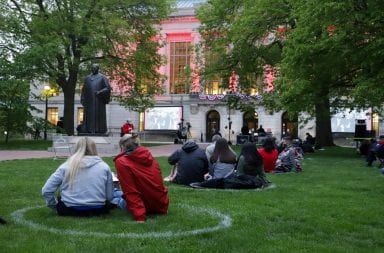The two Ohio State students arrested at Woodfest ’11 for allegedly assaulting a police officer could face suspension or expulsion, based on the Code of Student Conduct and actions taken by the university in past similar situations.
Two OSU students, Matthew Coleman, 19, and Brian Witt, 21, and one other man, Michael Shivak, 21, were charged with assaulting a police officer Sunday after officers from the Columbus Police Department used pepper spray to attempt to break up Woodfest, a block party on East Woodruff Avenue on Saturday that drew more than 1,000 students.
Judge Paul Herbert set the bail for the three suspects at $25,000 each. Coleman and Witt posted bond Monday morning, according to court documents. As of 9 p.m. Monday, Shivak had not posted bail.
Coleman and Witt did not immediately return The Lantern’s emails.
Andrea Goldblum, director of Student Judicial Affairs, stressed that each case is considered on an individual level and could not comment on whether her office will be taking action against Coleman or Witt. Goldblum said typically in instances involving allegations of assault, the Office of Judicial Affairs becomes involved.
“We take violence very seriously,” Goldblum said.
Goldblum wasn’t working for Student Judicial Affairs in 2001 and 2002 when disorderly behavior occurred on Chittenden Avenue during Chittfest, a block party similar in size to Woodfest. However, she said in cases where the student was involved in assault or another form of dangerous activity, they were “typically suspended from the university.”
According to its website, Student Judicial Affairs starts investigating cases after someone files a report of an incident or a violation of the Code of Student Conduct. Anyone can file reports, including students, University Housing and the Columbus Police Department.
Once a report is filed, the Office of Student Judicial Affairs investigates the allegations and then invites the accused to a preliminary conference where they learn about the charges made against them and then are allowed to make a statement regarding their alleged involvement. From there, Student Judicial Affairs issues sanctions if they believe the student violated the code and if the student disagrees, he can request a hearing.
In cases where the student is “considered a danger,” Goldblum said they can issue an interim suspension before the hearings start, where the student is “temporarily and immediately” removed from campus, pending the outcome of the disciplinary process.
Possible sanctions can include anything from an official reprimand to expulsion from the university.
Some students said if Coleman and Witt are suspended or expelled it would be too harsh of a punishment.
Natalie Arkfeld, a first-year in pharmaceutical sciences, thought Coleman and Witt were just in the wrong place at the wrong time.
“I don’t think they should be (suspended or expelled) because then you’d have to punish all of the people there who threw a can or anything at the officers,” Arkfeld said. “It just happened that they caught these guys.”
Jordan Wiesner, a second-year in industrial engineering, agreed.
“They want to set an example out of someone, but … it’s kind of ridiculous,” Wiesner said. “To blame everything on those individuals, it’s not fair to them.”
However, Willie Young, director of Off-Campus Student Services, said a suspension has worked in the past to set an example. After the Chittfest parties, OSU suspended and expelled some of the students involved.
Young said one of the suspended students was so affected by what happened, he and Young went door-to-door the next year before the anniversary of Chittfest to tell students about his experiences and to warn them about what could happen if the partying gets out of control. Young couldn’t release the student’s name because of privacy reasons.
Young said he wasn’t sure if they would be going door-to-door telling people about Woodfest, but said they are prepared to work with students on how to party responsibly, safely and legally.
“I guess the message would be is when the police tell you to disperse, you need to leave,” Young said. “This is not a request. This is a demand.”
Alexandra Wells, a first-year in human nutrition, agreed that students should have listened to police, and suspending or expelling Coleman and Witt would be a reasonable response to their actions.
“If they were assaulting a police officer I think they should be arrested and charged,” Wells said. “Police officers are not there to hurt you. They’re there to protect the general well-being.”
However, Arkfeld wondered why the police didn’t try to do something about Woodfest sooner, considering officers were patrolling the area long before the arrests happened.
“The police were there all night,” Arkfield said. “How could they have let it get that out of control?”
Thomas Bradley and Grace Ellis contributed to this story.


